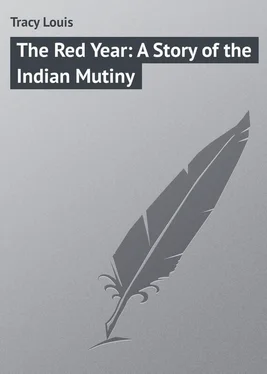Louis Tracy - The Red Year - A Story of the Indian Mutiny
Здесь есть возможность читать онлайн «Louis Tracy - The Red Year - A Story of the Indian Mutiny» — ознакомительный отрывок электронной книги совершенно бесплатно, а после прочтения отрывка купить полную версию. В некоторых случаях можно слушать аудио, скачать через торрент в формате fb2 и присутствует краткое содержание. Жанр: foreign_prose, на английском языке. Описание произведения, (предисловие) а так же отзывы посетителей доступны на портале библиотеки ЛибКат.
- Название:The Red Year: A Story of the Indian Mutiny
- Автор:
- Жанр:
- Год:неизвестен
- ISBN:нет данных
- Рейтинг книги:5 / 5. Голосов: 1
-
Избранное:Добавить в избранное
- Отзывы:
-
Ваша оценка:
- 100
- 1
- 2
- 3
- 4
- 5
The Red Year: A Story of the Indian Mutiny: краткое содержание, описание и аннотация
Предлагаем к чтению аннотацию, описание, краткое содержание или предисловие (зависит от того, что написал сам автор книги «The Red Year: A Story of the Indian Mutiny»). Если вы не нашли необходимую информацию о книге — напишите в комментариях, мы постараемся отыскать её.
The Red Year: A Story of the Indian Mutiny — читать онлайн ознакомительный отрывок
Ниже представлен текст книги, разбитый по страницам. Система сохранения места последней прочитанной страницы, позволяет с удобством читать онлайн бесплатно книгу «The Red Year: A Story of the Indian Mutiny», без необходимости каждый раз заново искать на чём Вы остановились. Поставьте закладку, и сможете в любой момент перейти на страницу, на которой закончили чтение.
Интервал:
Закладка:
The remainder of the space within the walls was packed with the houses and shops of well-to-do traders, and the lofty tenements or mud hovels in which dwelt a population of artisans noted not only for their artistic skill but for a spirit of lawlessness, a turbulent fanaticism, that had led to many scenes of violence in the city’s earlier history.
The whole of Delhi, as well as the palace – which had its own separate fortifications – was surrounded by a wall seven miles long, twenty-four feet in height, well supplied with bastions, and containing ten huge gates, each a small fort in itself. The wall was protected by a dry fosse, or ditch, twenty-five feet wide and about twenty feet deep; this, in turn, was guarded by a counterscarp and glacis.
On the northwest side of Delhi, and about a mile distant from the river, an irregular, rock-strewn spine of land, called the Ridge, rose above the general level of the plain, and afforded a panoramic view of the city and palace. The rising ground began about half a mile from the Mori Gate – which was situated on what may be termed the landward side of the Kashmir Gate. It followed a course parallel with the river for two miles, and at its northerly extremity were situated the principal European bungalows and the military cantonment.
Delhi was the center of Mohammedan hopes; its palace held the lineal descendant of Aurangzebe, with his children and grandchildren; it was stored to repletion with munitions of war; yet, such was the inconceivable folly of the rulers of India at that time, the nearest British regiments were stationed in Meerut, while the place swarmed with native troops, horse, foot and artillery!
A May morning in the Punjab must not be confused with its prototype in Britain. Undimmed by cloud, unchecked by cooling breeze, the sun scorches the earth from the moment his glowing rays first peep over the horizon. Thus men who value their health and have work to be done rise at an hour when London’s streets are emptiest. Merchants were busy in the bazaar, soldiers were on parade, judges were sitting in the courts of the cutcherry, and the European housewives of the station were making their morning purchases of food for breakfast and dinner, when some of the loungers on the river-side wall saw groups of horsemen raising the dust on the Meerut road beyond the bridge of boats which spanned the Jumna.
The word went round that something unusual had happened. Already the idlers had noted the arrival of a dust-laden royal carriage, which crossed the pontoons at breakneck speed and entered by the Calcutta Gate. That incident, trivial in itself, became important when those hard-riding horsemen came in sight. The political air was charged with electricity. None knew whether it would end in summer lightning or in a tornado, so there was much running to and fro, and gesticulations, and excited whisperings among those watchers on the walls.
Vague murmurs of doubt and surprise reached the ears of two of the British magistrates. They hurriedly adjourned the cases they were trying and sent for their horses. One rode hard to the cantonment and told Brigadier Graves what he had seen and heard; the other, knowing the immense importance of the chief magazine, went there to warn Lieutenant Willoughby, the officer in charge.
Here, then, in Delhi, were men of prompt decision, but the troops on whom they could have depended were forty miles away in Meerut, in that never-to-be-forgotten bivouac. Meanwhile, the vanguard of the Meerut rebels had arrived. Mostly troopers of Malcolm’s regiment, with some few sepoys who had stolen ponies on the way, they crossed the Jumna, some going straight to the palace by way of the bridge of boats, while others forded the river to the south and made for the gaol, where, as usual, they released the prisoners. This trick of emptying the penitentiaries was more adroit than it seems at first sight. Not only were the mutineers sure of obtaining hearty assistance in their campaign of robbery and murder, but every gaol-bird headed direct for his native town as soon as he was gorged with plunder. There was no better means of disseminating the belief that the British power had crumbled to atoms. The convicts boasted that they had been set free by the rebels; they paraded their ill-gotten gains and incited ignorant villagers to emulate the example of the towns. Thus a skilful and damaging blow was struck at British prestige. Neither Mohammedan moullah nor Hindu fakir carried such conviction to ill-informed minds as the appearance of some known malefactor decked out in the jewels and trinkets of murdered Englishwomen.
The foremost of the mutineers reined in their weary horses beneath a balcony on which Bahadur Shah, a decrepit old man of eighty, awaited them.
By his side stood his youngest daughter, the Roshinara Begum. Her eyes were blazing with triumph, yet her lips curved with contempt at the attitude of her trembling father.
“You see!” she cried. “Have I not spoken truly? These are the men who sacked Meerut. Scarce a Feringhi lives there save those whom I have saved to good purpose. Admit your troops! Proclaim yourself their ruler. A moment’s firmness will win back your empire.”
The aged monarch, now that the hour was at hand that astrologers had predicted and his courtiers had promised for many a year, faltered his dread lest they were not all committing a great mistake.
“This is no woman’s work,” he protested. “Where are my sons? Where is the Shahzada, Mirza Mogul?”
She knew. The heir apparent and his brothers were cowering in fear, afraid to strike, yet hoping that others would strike for them. She almost dragged her father to the front of the balcony. The troopers recognized him with a fierce shout. A hundred sabers were waved frantically.
“Help us, O King!” they cried. “We pray your help in our fight for the faith!”
Captain Douglas, commandant of the palace guards, hearing the uproar ran to the King. He did not notice the girl Roshinara, who stood there like a caged tigress.
“How dare you intrude on the King’s privacy?” he cried, striving to overawe the rebels by his cool demeanor. “You must lay down your arms if you wish His Majesty’s clemency. He is here in person and that is his command.”
A yell of defiance greeted his bold words. The Begum made a signal with her hand which was promptly understood. Away clattered the troopers towards the Raj Ghât Gate. There they were admitted without parley. The city hell hounds sprang to meet them and the slaughter of inoffensive Europeans began in Darya Gunj.
It was soon in full swing. The vile deeds of the night at Meerut were re-enacted in the vivid sunlight at Delhi. Leaving their willing allies to carry sword and torch through the small community in that quarter the sowars rode to the Lahore Gate of the palace. It was thrown open by the King’s guards and dependents. Captain Douglas, and the Commissioner, Mr. Fraser, made vain appeals to men whose knees would have trembled at their frown a few minutes earlier. Thinking to escape and summon assistance from the cantonment, Douglas mounted the wall and leaped into the moat. He broke one, if not both, of his legs. Some scared coolies lifted him and carried him back to the interior of the palace. Fraser tried to protect him while he was being taken to his apartments over the Lahore Gate, but a jeweler from the bazaar stabbed the Commissioner and he was killed by the guards. Then the mob rushed up-stairs and massacred the collector, the chaplain, the chaplain’s daughter, a lady who was their guest, and the injured Douglas.
Another dreadful scene was enacted in the Delhi Bank. The manager and his brave wife, assisted by a few friends who happened to be in the building at the moment, made a stubborn resistance, but they were all cut down. The masters in the Government colleges were surprised and murdered in their class-rooms. The missionaries, whether European or native, were slaughtered in their houses and schools. The editorial staff and compositors of the Delhi Gazette , having just produced a special edition of the paper announcing the crisis, were all stabbed or bludgeoned to death. In the telegraph office a young signaler was sending a thrilling message to Umballa, Lahore and the north.
Читать дальшеИнтервал:
Закладка:
Похожие книги на «The Red Year: A Story of the Indian Mutiny»
Представляем Вашему вниманию похожие книги на «The Red Year: A Story of the Indian Mutiny» списком для выбора. Мы отобрали схожую по названию и смыслу литературу в надежде предоставить читателям больше вариантов отыскать новые, интересные, ещё непрочитанные произведения.
Обсуждение, отзывы о книге «The Red Year: A Story of the Indian Mutiny» и просто собственные мнения читателей. Оставьте ваши комментарии, напишите, что Вы думаете о произведении, его смысле или главных героях. Укажите что конкретно понравилось, а что нет, и почему Вы так считаете.












